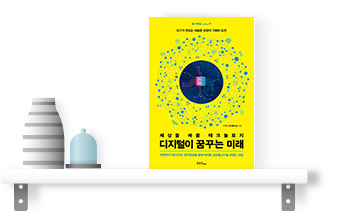VOL.54
July 2019


ICT Trend — Big Data Analysis and Solution
What Big Data Says
to the World
Big Data Analysis and Solution
We are living in a world where people with more data are more likely to win. Quality data can be now compared to monetary currency. The issue is who will be able to effectively accumulate and use data and turn it into related services. Data itself means economy and money these days. What solutions can be found in the message of big data for the world?


Emerging Capital in New Era
A story contributed to the New York Times by Charles Duhigg, writer and journalist, highlights the importance of data. One man with a teenager daughter protested to a local Target store, questioning why his daughter was receiving coupons for baby clothes and cribs from Target. The man was upset and asked if Target wanted to encourage his daughter to get pregnant. A few days later, however, the man went to the store manager and apologized because his daughter was in fact pregnant. How did that retailer find out that the man’s teenager daughter was pregnant? Target’s customer behavior analysis system observed that the daughter had bought cocoa-butter lotion, a purse large enough to double as a diaper bag, zinc and magnesium supplements, and a bright blue rug. The analysis system analyzed the customer’s behavior and found that she was 83% likely to be pregnant.
Today, data helps us to find new information, such as who among the many presidential candidates will become elected. ETRI, where I currently work, was established 43 years ago, and some members raised an issue that the institution has focused on research so much so that it made insufficient efforts to accumulate systematic R&D data on the research achievements of its researchers. In response, ETRI organized the Sharing and Collaboration Promotion Unit to enhance its capacity by accumulating research outcomes and to create new value by sharing and converging collaborative works. One aspect the government needs to address in connection with data is the high barriers between government agencies that undermines active sharing of data. The government owns all results produced with taxpayers’ money. It is difficult to disclose all information to the public due to many reasons such as protection of privacy. As mentioned earlier, however, data in this new era can be translated into information, services, and money. Data held by the government needs to be disclosed for sharing and collaboration among governments and institutions. In the future, such data will have to be made public to private companies based on a strict validation process for data disclosure. It will take time until the public can enjoy substantial services from the data provided by the government in connection with big data. Still, it will be worth making administrative efforts to return data to the public.

Big Data Predicts Future Cities
As a central administrative agency responsible for various statistics, Statistics Korea conducts an annual census as a comprehensive survey of the population and households. Interestingly, such a survey even existed about 2,000 years ago, as one document on civilian rule supports that censuses were conducted every three years. The slogan of the 2015 census was “Tell us your changes. There is nothing more valuable than your story for Korea’s different future.” The survey items included place of birth, level of education, area of major, and anticipated number of children, and the number of sample items was as many as 52 including the required data of family members. That is why it took more than one hour to respond to the survey. Korea’s census data is of high quality and of significant importance to design the future of the nation based on such data. The results of the census are also used in developing various services.
What about the data held by the National Health Insurance Service, Health Insurance Review and Assessment Service, National Pension Service, and Government Employees Pension Service? These data contain useful information demonstrating people’s quality of life, health, and life patterns. These high-quality data can show when people in their 50s with high blood pressure are more likely to collapse, the later life and diseases of office workers and government employees who retire without significant notable diseases, what kind of diseases are often contracted by the public, and which medicine is frequently used for which diseases. How about the Military Manpower Administration? This agency holds all information on the military resources of Korea. As a country witnessing a drastic demographic cliff, Korea can use the data of the Military Manpower Administration to develop efficient measures to control military resources in the era of a decreasing population.
In this respect, a number of local governments are asking ETRI researchers to predict the future of their region based on big data. For instance, some local governments want to address the issue of decreasing population, which is not being resolved with a childbirth incentive worth millions of won. In fact, the government of Haenam, Jeollanam-do, became the nation’s first local government in 2008 to establish a childbirth policy team. This government pays a childbirth incentive of KRW 3 million for the first child, KRW 3.5 million for the second, KRW 6 million for the third, and KRW 7.2 million for the fourth and subsequent. Another local government introduced a measure to pay an incentive of tens of millions of won for parents who have three or more children. As this demonstrates, the government has spent more than KRW 150 trillion since 2006 to boost the birth rate. How can researchers solve this problem? They can analyze the patterns, but it is more difficult to provide solutions. However, analysis customized for each local government based on the data refined from big data will be able to deliver a more visible population-welfare simulation.

Beyond Use of Public Data, Toward Openness
In 2017, the number of newborns failed to reach 400,000, the lowest number in history. If this trend continues, by the time these babies reach the age to enter colleges, half the colleges nationwide will have to be shut down. Universities are being restructured due to the risks posed by population decrease, but this will not be sufficient to stay competitive and survive. By 2020, the number of high school seniors who will take the college entrance exam will be equal to the entrance quota of all colleges. Then, from 2021 we will actually witness some colleges being closed. The Ministry of Education has recently predicted that about 38 universities may be closed within the next two to three years, but the number could rise to 70. The college entrance quota for 2021 will be 56,000, more than the number of potential freshmen. Of course, this estimation was made based on 333 colleges nationwide.
If this really happens, many faculty and staff at private schools and other related persons will have to retire, which will adversely affect the pension system. The current crisis would have been avoided if such prediction had been made earlier based on a review of birthrates and appropriate action had been implemented. Due to a complacent response to the changing trends, the challenges have reached a point beyond which they can be resolved easily.
It is said that, in two years, Korea will be ranked 1st among the OECD member nations again—this time, in terms of the student-teacher ratio. Professor and demographer Yeong-tae Jo at Seoul National University says that “about 70,000 teachers will be superfluous by 2025, only eight years from now.” Big data with high quality is able to present useful policy directions. In a sense, fine data will have value just as money. Therefore, it will be important to collect much data, but it will be also important to have fine data. Luckily, the Korean government and government agencies have high-quality data, and policy created based on such data will be able to produce various business services and ensure more effective administration.
Currently, the Korean government is developing a range of measures to share and use data at the national level. One potential measure is to disclose public data and develop and open in phases a platform to distribute public and private data. The data held by the government and government agencies will certainly have to be disclosed to a specific group of people with sufficient authentication and security measures as such data is related to the privacy of the general public. This may also invigorate venture and technology-based startups.
This article is quoted from Technology That Will Change the World, Future Brought by Digital Technology, ETRI’s Easy IT series (2018).

Future Brought by Digital Technology
Written by Kilho, Chong · ETRI's Superior Public Relations Section Published by Contentshada
Future Brought by Digital Technology issued by ETRI aims to help readers better understand what the Fourth Industrial Revolution means to them and to introduce various ICT trends so that readers can have a fascinating glimpse of what might happen in the near future. This book will be a reliable guide for anyone who wants to learn and understand how to adapt to the rapidly changing, unpredictable world driven by technological innovations and flexibly respond to risks that might be faced going forward.



